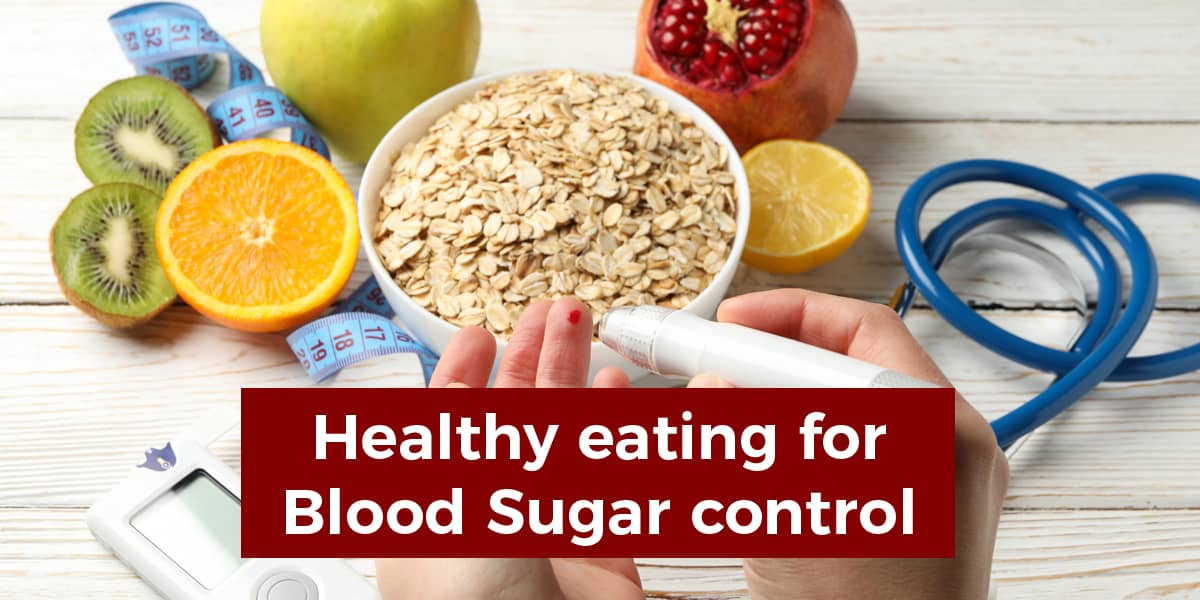For those suffering from diabetes, controlling blood sugar is not that difficult!
More than 72.9 million Indians are suffering from chronic diabetes. And only a portion of this population takes the right steps to manage their diabetes well. When not managed correctly, diabetes can lead to neuropathy, nephropathy, chronic heart disease, and cataract. It can also lead to other significant complications like retinopathy.
Health experts will agree that for diseases like diabetes, medications are simply not enough. A regulated diabetic diet and a healthy lifestyle is the only way to tackle this disease. The right diet can help in managing, preventing, and treating this lifestyle disorder.
A diet high in fruits, vegetables, whole grains, legumes, and low-fat dairy products can help in managing your blood sugar levels. However, the main focus should be on daily carbohydrate intake.
Food rich in vegetables and fruits provides a punch of nutrition. In addition to that, they are also high in fiber which takes longer to digest. This means such foods would release glucose slowly in the body and will not result in a spike in blood glucose levels.
While foods high in carbohydrates like bread, pasta, and rice, soft drinks and sugars should be avoided. Such foods can result in sharp spikes in your blood sugar levels and can boost blood triglyceride levels.
Healthy Eating in diabetes – Soluble fibers
Several studies revealed that soluble fiber improves insulin sensitivity. It further takes longer to digest and releases a steady stream of glucose in your blood thereby preventing a sudden spike in your blood glucose levels. Furthermore, foods rich in fiber keep you satiated for long and curb your hunger pangs.
Healthy eating for blood sugar control – Does it work?
Controlling blood sugar levels is not an easy task. Nutrition is one of the primary steps to fight against high blood sugar levels.
Obesity can be both the cause and the symptom of diabetes. So, it is crucial that weight management is done in a proper manner. One must follow a balanced diet in order to lose weight and also, consume the right amount of essential nutrients.
A diet with fewer carbohydrates and fats, and a more protein and micro-nutrient-oriented diet are generally recommended. Carbs and fats get absorbed by the body very easily forming excess glucose. Due to the lack of insulin production, this concentrated sugar leads to high blood sugar levels.
However, carbohydrates are the building blocks of the body. Therefore, cutting down the carbs would require some other nutrient to fill in. Protein oriented diet is very crucial in order to protect the body against other complications like cardiovascular disease.
Good protein with a low glycemic index is helpful in losing weight and also, reducing the risk of heart diseases. Protein generally takes time to break down in the bloodstream. This prevents the sudden spike of glucose in the blood, further controlling the blood sugar levels.
Micronutrients, on the other hand, are very important for diabetes. Generally, the deficiency of micronutrients causes diabetes due to poor food choices. For instance, Magnesium and zinc are the two main nutrients that help in stimulating insulin secretion in the blood. This helps in optimizing the glucose levels in the blood.
Eating healthy and abstinence from alcohol, smoking, and a good amount of exercise can help tackle uncontrolled blood sugar levels.
Do’s in the diet
Patients with diabetes always have this misconception that they have to abstain from eating. A diabetic patient must eat in smaller portions at multiple intervals in order to prevent a sudden spike in blood sugar levels at once.
The diet of a diabetic must include:
- Non-starchy vegetables with high fiber content must be included in the diet. As fibers help to absorb the fat which promotes weight loss. For example spinach, sweet potatoes, green beans, broccoli, etc.
- Lean meat and plant-based protein must be included in the diet as they have a lower glycemic index. For example chicken, fish, and soya beans.
- Lentils and citric fruits are powerhouses of minerals and vitamins that are crucial in the diet of a diabetic. For example Rajma, moong dal, etc.
- Oils that are liquid at room temperature such as canola oil, sesame seed oil, mustard oil, etc. have omega-3 fatty acids. They promote heart health and don’t interfere with blood sugar levels.
Including the above-mentioned dietary elements in the diet in smaller portions, will undoubtedly help the patient in controlling the blood sugar level.
Don’ts in the diet
There is no doubt that there are certain crucial restrictions on the diet of a diabetic. The following are the things that diabetic patients must limit themselves from:
- Starchy vegetables such as potatoes, yams, etc, must be avoided as they have a high GI.
- Red meat has a lot of fat content and also has high bad cholesterol levels.
- Dairy products that have high-fat content must be avoided as they cause heart health issues.
- Deep-fried foods.
Your Takeaway!
Diabetes is a difficult disease to manage. Not following the right diet is one of the main reasons why diabetic patients report complications. However, a healthy lifestyle change can reduce the risk factors pertaining to diabetes. A balanced diet is definitely the key to keeping diabetes in check.
Also Read:
10 Amazing Breakfast Recipes for diabetes


3 comments
[…] treatments for sexual dysfunction. Some may be experiencing problems related to conditions such as diabetes, hypertension, stress, stroke, aging, or side effects from other medications. Others may be seeking […]
[…] 35 and 75 percent at some point in their lives. Compounding the issue, some studies suggest that diabetes can accelerate the onset of erectile dysfunction by up to 15 […]
[…] blood pressure and diabetes are the major causes of kidney damage. High blood pressure or diabetes can damage the blood vessels in the kidney, thus, impacting their function. The antioxidant […]